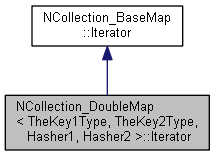#include <NCollection_DoubleMap.hxx>
◆ Iterator() [1/2]
template<class TheKey1Type, class TheKey2Type, class Hasher1 = NCollection_DefaultHasher<TheKey1Type>, class Hasher2 = NCollection_DefaultHasher<TheKey2Type>>
◆ Iterator() [2/2]
template<class TheKey1Type, class TheKey2Type, class Hasher1 = NCollection_DefaultHasher<TheKey1Type>, class Hasher2 = NCollection_DefaultHasher<TheKey2Type>>
◆ Key1()
template<class TheKey1Type, class TheKey2Type, class Hasher1 = NCollection_DefaultHasher<TheKey1Type>, class Hasher2 = NCollection_DefaultHasher<TheKey2Type>>
| const TheKey1Type & NCollection_DoubleMap< TheKey1Type, TheKey2Type, Hasher1, Hasher2 >::Iterator::Key1 |
( |
void | | ) |
const |
|
inline |
◆ Key2()
template<class TheKey1Type, class TheKey2Type, class Hasher1 = NCollection_DefaultHasher<TheKey1Type>, class Hasher2 = NCollection_DefaultHasher<TheKey2Type>>
| const TheKey2Type & NCollection_DoubleMap< TheKey1Type, TheKey2Type, Hasher1, Hasher2 >::Iterator::Key2 |
( |
void | | ) |
const |
|
inline |
◆ More()
template<class TheKey1Type, class TheKey2Type, class Hasher1 = NCollection_DefaultHasher<TheKey1Type>, class Hasher2 = NCollection_DefaultHasher<TheKey2Type>>
Query if the end of collection is reached by iterator.
◆ Next()
template<class TheKey1Type, class TheKey2Type, class Hasher1 = NCollection_DefaultHasher<TheKey1Type>, class Hasher2 = NCollection_DefaultHasher<TheKey2Type>>
Make a step along the collection.
◆ Value()
template<class TheKey1Type, class TheKey2Type, class Hasher1 = NCollection_DefaultHasher<TheKey1Type>, class Hasher2 = NCollection_DefaultHasher<TheKey2Type>>
| const TheKey2Type & NCollection_DoubleMap< TheKey1Type, TheKey2Type, Hasher1, Hasher2 >::Iterator::Value |
( |
void | | ) |
const |
|
inline |
The documentation for this class was generated from the following file:

 Public Member Functions inherited from NCollection_BaseMap::Iterator
Public Member Functions inherited from NCollection_BaseMap::Iterator Protected Member Functions inherited from NCollection_BaseMap::Iterator
Protected Member Functions inherited from NCollection_BaseMap::Iterator Protected Attributes inherited from NCollection_BaseMap::Iterator
Protected Attributes inherited from NCollection_BaseMap::Iterator